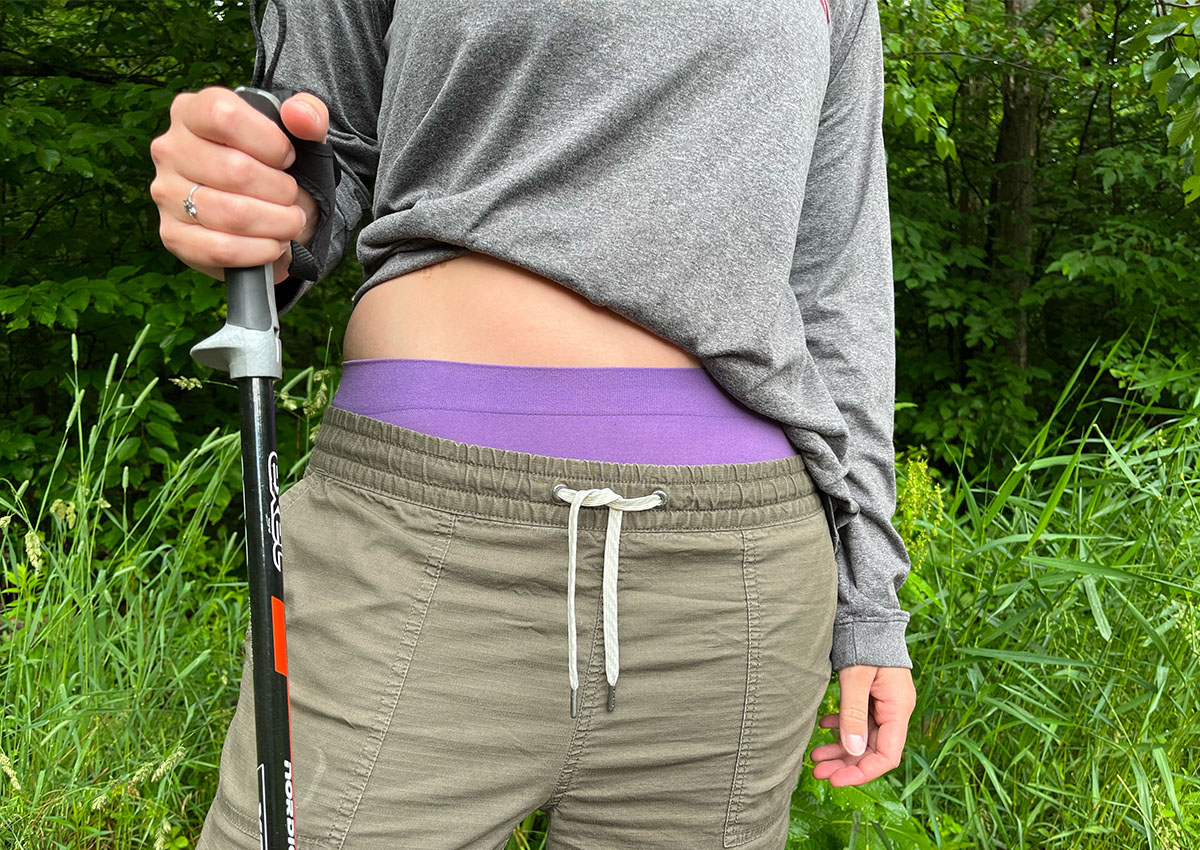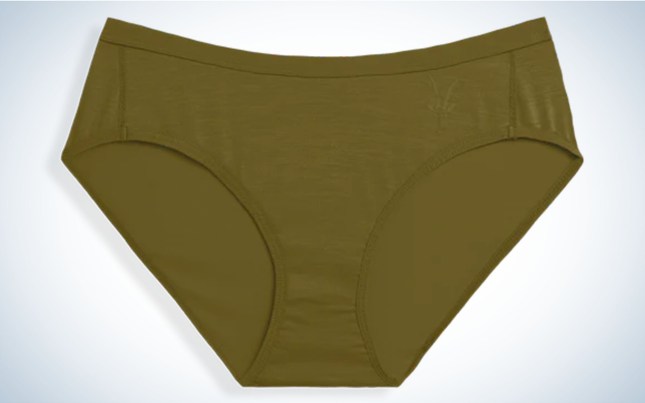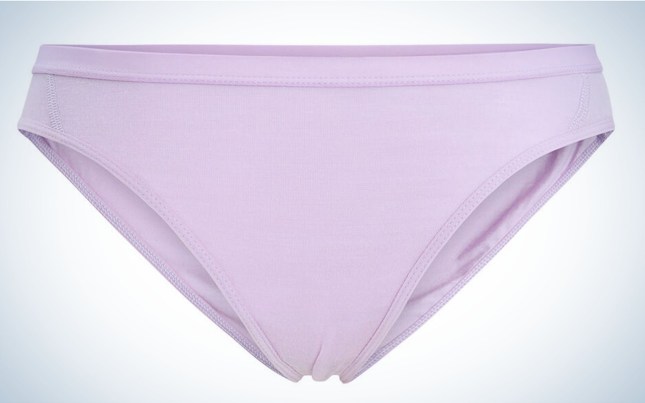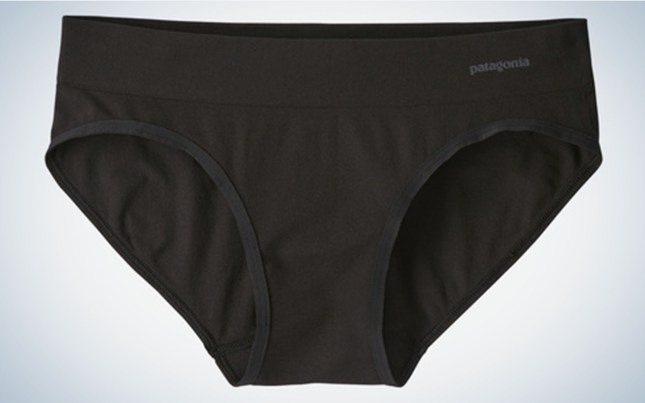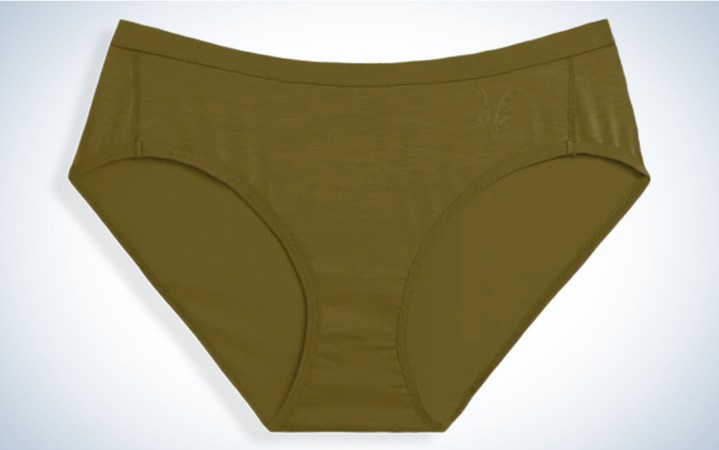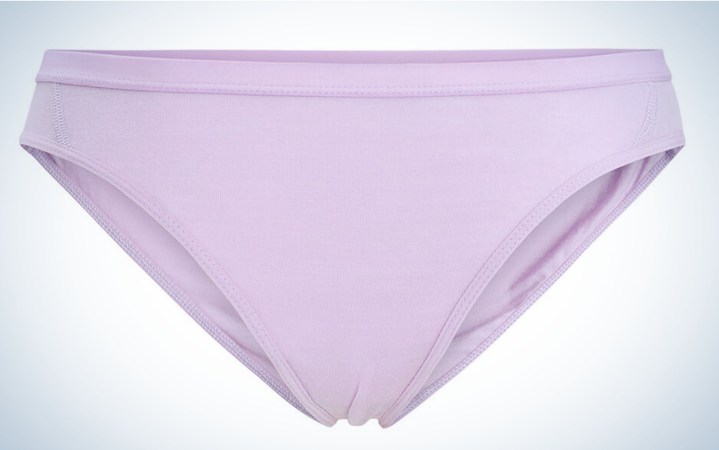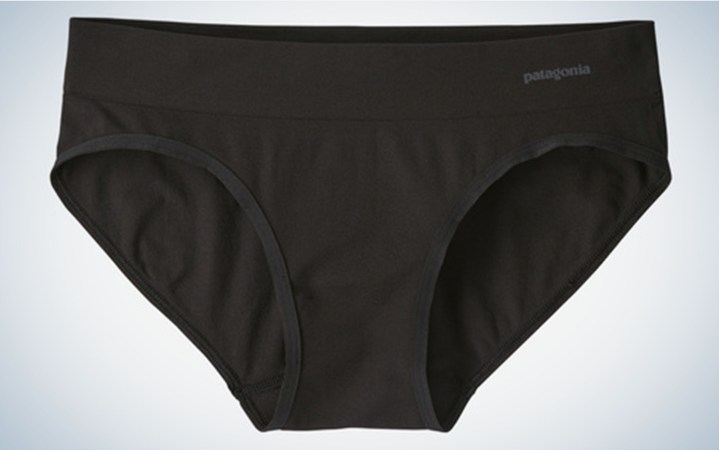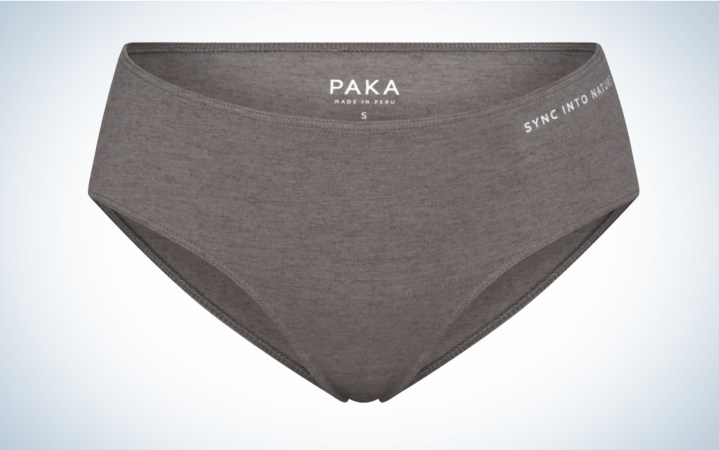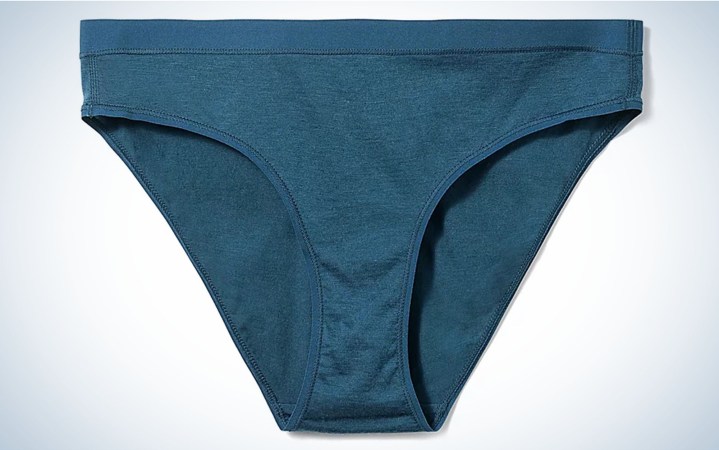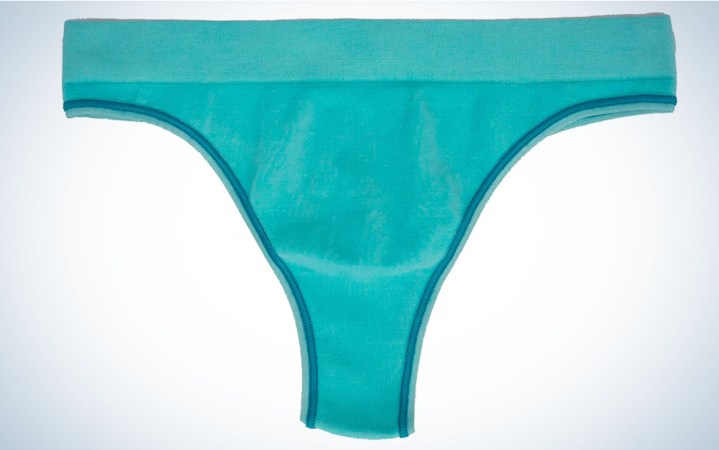We may earn revenue from the products available on this page and participate in affiliate programs. Learn More ›
Finding the ideal underwear for your body type and comfort preferences is difficult enough without throwing in rigorous movement and sweat. Active women need underwear that stays in place, wicks sweat, and is odor resistant. The journey to find the style and brand that works for you can be long and arduous. To save you some time, and distracting discomfort on trail, we tested the best hiking underwear for women to determine which pairs fit best and felt most comfortable.
- Best Overall: Ibex Women’s Natural Brief
- Best Full-Coverage: Icebreaker Merino Siren Bikini Briefs
- Best Synthetic: Patagonia Women’s Active Hipster
- Best Wool Alternative: Paka Alpaca Underwear
- Best Medium-Coverage: Smartwool Merino Brief
- Paradis Sport Seamless Thong
How We Chose the Best Hiking Underwear for Women
Your first layer on trail is underwear and it has more responsibilities than you might think. If you’re fighting wedgies, dampness, and twisting all day, the constant rearranging will slow you down. And if you’re washing your underwear on trail or wearing them for multiple days, odor control is required. OL staff writer Laura Lancaster and I tested top brands in varying styles and materials to determine which ones we’d wear, clean, and repeat on backpacking trips and which would be relegated to streetwear only.
Best Hiking Underwear for Women: Reviews & Recommendations
Best Overall: Ibex Women’s Natural Brief
Best Overall
Ibex Women’s Natural Brief
Key Features
- Sizes: XS-XL
- Fabric Content: 83 percent merino wool, 12 percent nylon, 5 percent elastane
- Available Styles: Brief, thong
Pros
- Odor resistant
- Comfortable
- Good coverage
Cons
- Thinner waistband
You might think of wool as a winter-exclusive material and not at all what you want rubbing on your bum all day. But wool has a ton of great features that make the best hiking socks and this merino underwear ideal for year-round adventures. While wool has a reputation for being scratchy, ultra-fine merino wool is very soft. It also has a number of qualities that traditional cotton underwear does not, helping to regulate your body temperature, drying out quickly, and breathing surprisingly well. The high merino wool content in Ibex’s natural hiking underwear gives them excellent odor control and a comfortable feel.
During testing, they provided good coverage, with no slipping. They stayed comfortable when they were wet, as well as for multiple days in a row on longer backpacking trips. This is because the merino wicks away moisture while the naturally antimicrobial fabric lets go of smells. But they’re also soft and comfortable enough for everyday wear. The elastic is thinner, but it is soft and recovers well so it doesn’t dig in or stretch out.
Best Full-Coverage: Icebreaker Merino Siren Bikini Briefs
Best Full-Coverage
Icebreaker Merino Siren Bikini Briefs
Key Features
- Sizes: XS to XL
- Weight: 1.12 ounces (small)
- Fabric Content: 83 percent merino wool, 12 percent nylon, 5 percent lycra
- Available Styles: Bikini brief, hipkini brief, thong
Pros
- Soft
- Dries quickly
- Multiple styles available
Cons
- Stretches out more quickly in between washes
The Icebreaker has a very similar fabric composition to the Ibex hiking underwear. They even have a similar cut. Icebreaker uses merino corespun, a durable merino blend where finer merino strands, with all of their performance benefits, are wrapped around a stronger nylon core. This allows your hiking underwear to regulate your body temperature in all weather conditions, wick moisture, and prevent smells while lasting longer.
The icebreaker is available in the hipkini brief for even more coverage than the bikini brief, or a thong. During testing, the fabric did tend to give more and stretch out a bit quicker than the Ibex natural brief in between washes.
Best Synthetic: Patagonia Women’s Active Hipster
Best Synthetic
Patagonia Women’s Active Hipster
Key Features
- Sizes: XS to XL
- Weight: 1.1 ounces
- Fabric Content: 88 percent nylon (40 percent recycled),12 percent spandex
- Available Styles: Bikini, hipkini, barely hipkini
Pros
- miDori bioSoft for added wicking and softness
- HeiQ Pure provides odor control
Cons
- Not wool
- No thong option
If you have a wool sensitivity, or just a wool addiction, this synthetic option from Patagonia is a nice change of pace. OL’s resident wool-head Laura Lancaster says she wouldn’t normally pick a synthetic pair of underwear for hiking, but she found them comfortable and surprisingly capable.
The miDori bioSoft is a softening treatment that aids in moisture wicking by helping the fabric absorb more moisture and expediting evaporation. HeiQ Pure is a 90 percent bio-based treatment that prevents odor from clinging to your clothes with a small amount of recycled silver and salt. These are slightly cheaper than our wool picks and have a couple style choices. The barely hipkini features a smaller waistband than the active models.
Best Wool Alternative: Paka Alpaca Underwear
Key Features
- Sizes: XS-XXL
- Fabric Content: 48 percent tencel, 33 percent organic cotton, 14 percent royal alpaca, 5 percent spandex (in waistband)
- Available Styles: Brief
Pros
- Breathable
- Soft
- Odor resistant
Cons
- Only one style
Paka’s soft and lightweight briefs stay in place and resist odor. They’re breathable and stretchy for unrestricted motion and comfort. The alpaca fibers provide moisture wicking, anti-microbial properties, and odor resistance. If you’ve struggled with sheep’s wool in the past, alpaca wool is worth a try.
Best Medium-Coverage: Smartwool Merino Brief
Best Medium-Coverage
Smartwool Merino Brief
Key Features
- Sizes: XS to XL
- Fabric Content: 88 percent merino wool, 12 percent nylon
Pros
- Stretchy
- Soft elastic
Cons
- Wedgie-prone
Smartwool uses a similar spinning technique to Icebreaker where the durable nylon is encased in soft merino fibers. The fabric feels soft, stretchy, and breathable. The slim cut is designed to hug your curves. However for those with hiker glutes, this underwear tends to stretch and slide into an uncomfortable position.
The wool is quality with nice odor control and moisture wicking. But the medium-coverage cut and stretchability means for some, it won’t stay in place while hiking. If you tend to prefer a slim cut or want extra stretch in the fabric, these could prove to be very comfortable.
Paradis Sport Seamless Thong
Best Thong
Paradis Sport Seamless Thong
Key Features
- Sizes: S to L
- Fabric Content: 94 percent nylon and 6 percent spandex
- Available Styles: Bikini, thong
Pros
- Made in the USA
- Stays in place
- Breathable
Cons
- Thin
- No odor control
- Tight
Paradis Sport is creating soft, athletic underwear that stays in place while exercising. The brief and thong have stretch, moisture-wicking, and quick-drying qualities for hiking. The fabric is thinner allowing for the right amount of support and breathability. However, the thinness might have contributed to some pilling on the rear of the bikini.
The thong’s thick waistband never rolls and the material feels fresh on my skin. Best for day hikes or short backpacking trips, these don’t offer much odor control. Now a natural fiber version is available using micro-modal which is sustainably harvested from beech tree pulp. However, I no longer reach for the Paradis sport underwear because while they never budge on long hikes, they are tight and irritating on the groin area. If this fit issue sounds bothersome to you, opt for something more loose fitting.
How to Choose the Best Hiking Underwear for Women
The best hiking underwear for women should stay in place, feel comfortable, dry quickly, and reduce odor. Your body type will likely have a lot to do with the staying power and comfort of your underwear so check sizes, styles, and measurements like you would other performance apparel. Sweat, rain, and river crossings can dampen your drawers so a fast dry-time will keep you more comfortable. If you’re traveling, you might also need to wash clothes on the go and the faster your first layer dries, the better. Odor control is great on trail to town days and when you’re hiking for days or weeks at a time.
FAQs
Yes, I would recommend wearing underwear under your base layers. Underwear is designed to provide support and protection while thermal underwear is really only for warmth. Base layers are also typically made of wool or feature an anti-odor quality. That means you can rewear them multiple times and a fresh pair of hiking underwear will make that a more hygienic experience as well as prevent chafing.
Cotton is not good for hiking. Whether it’s underwear, a shirt, or a hat, cotton is a woefully inadequate material for excessive exercise, especially outdoors. Cotton soaks up sweat and water. Then it takes a long time to dry leaving you sticky, clammy, and damp. If the temperatures drop, this could put you in a severely risky situation. With hiking underwear, cotton is particularly bad because it will retain all moisture, leaving you at risk for infection and a very uncomfortable hike. The last thing anyone wants 40 miles from civilization is a UTI.
Wool is a particularly apt material for sweating because it is breathable, quick-drying, and moisture-wicking. These properties can help your body temperature regulate while staying comfortable. Wool is traditionally used as an insulator, but the wool options on this list are great all year-round. The fibers react with your body temperature to retain heat in winter and breathe easily in the summer. Wool can absorb the moisture produced by your body and allow it to evaporate quickly, before you feel sweaty and clammy.
Read Next: Best Underwear for Hiking
Final Thoughts on the Best Hiking Underwear for Women
Wedgies, too-tight elastic, and rolling waistbands are unacceptable on trail. Don’t let bargain britches slow you down. The underwear on this list is made of high-quality materials and designed for active lifestyles. Find the pair that’ll best fit you below:
- Best Overall: Ibex Women’s Natural Brief
- Best Full-Coverage: Icebreaker Merino Siren Bikini Briefs
- Best Synthetic: Patagonia Women’s Active Hipster
- Best Wool Alternative: Paka Alpaca Underwear
- Best Medium-Coverage: Smartwool Merino Brief
- Thong: Paradis Sport Seamless Thong
